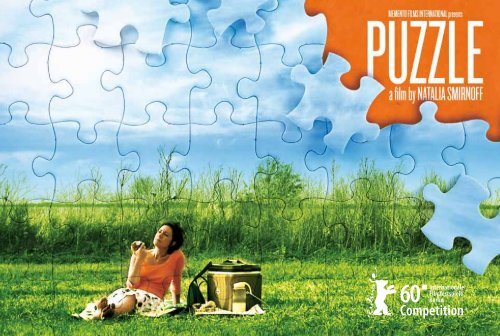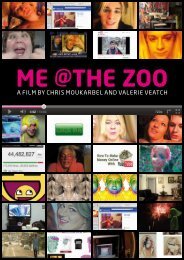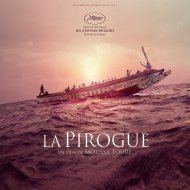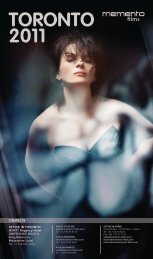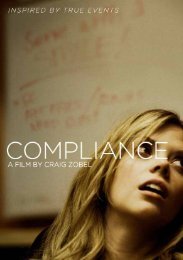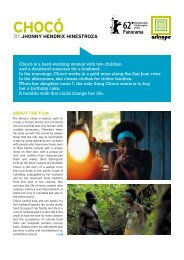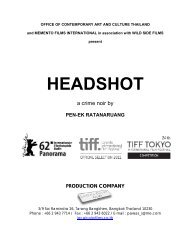Press Kit - Memento Films International
Press Kit - Memento Films International
Press Kit - Memento Films International
- No tags were found...
You also want an ePaper? Increase the reach of your titles
YUMPU automatically turns print PDFs into web optimized ePapers that Google loves.
PRODUCTION CONTACTS<br />
CARROUSEL FILMS | Argentina<br />
Gabriel Pastore<br />
Tel/Fax: + 5411 4586 4065<br />
info@carrouselfilms.com<br />
LA NINAS PICTURES | France<br />
Caroline Dhainaut<br />
Tel: +33 1 42 72 22 81<br />
caroline.dhainaut2@orange.fr<br />
INTERNATIONAL PRESS<br />
IN BERLIN<br />
ALIBI COMMUNICATIONS<br />
Brigitta Portier<br />
Raymond Lauwersstraat 37 a<br />
1560 Hoeilaart - Belgium<br />
Mob: +32 477 98 25 84<br />
alibi-com@skynet.be<br />
WORLD SALES AND FESTIVALS<br />
MEMENTO FILMS INTERNATIONAL<br />
9 cité Paradis - 75010 Paris, France<br />
Tel: +33 1 53 34 90 20<br />
sales@memento-films.com<br />
festival@memento-films.com<br />
CREW<br />
Executive Producer<br />
GABRIEL PASTORE<br />
Art Director<br />
MARIA EUGENIA SUEIRO<br />
Director of Photography and Camera<br />
BARBARA ALVAREZ<br />
Assistant Director and Casting<br />
NATALIA URRUTI<br />
Costume Design<br />
JULIO SUAREZ<br />
Production Manager<br />
LUCIA RIES<br />
Sound Director<br />
FERNANDO SOLDEVILA<br />
Editor<br />
NATACHA VALERGA<br />
Original Music<br />
ALEJANDRO FRANOV<br />
Produced by<br />
GABRIEL PASTORE, CAROLINE DHAINAUT,<br />
LUIS SARTOR, NATALIA SMIRNOFF<br />
Written and Directed by<br />
NATALIA SMIRNOFF<br />
CAST<br />
MARIA ONETTO | Maria del Carmen<br />
GABRIEL GOITY | Juan<br />
ARTURO GOETZ | Roberto<br />
HENNY TRAILES | Carlotta<br />
FELIPE VILLANUEVA | Juan Pablo<br />
JULIAN DOREGGER | Iván<br />
NORA ZINSKY | Raquel<br />
MARCELA GUERTY | Susana<br />
MIRTA WONS | Graciela<br />
MERCEDES FRAILE | Carmen<br />
DENISE GROESMAN | Victoria<br />
JIMENA RUIZ ECHAZU | Carla<br />
PACHO GUERTY | Pedro<br />
NESTOR CANIGLIA | Ricardo<br />
88 minutes | Color | Spanish | Argentina, French<br />
RED ONE blowup to 35mm | 1:85 | Dolby-SRD/SR
Maria del Carmen is a forty-something housewife whose only concern over the past<br />
twenty years has been the well-being of her husband and of her now grown-up<br />
kids. But when she is offered a puzzle for her birthday, she suddenly discovers she<br />
has a very special gift: she can assemble puzzles really fast!<br />
Intrigued by an ad “Looking for Partner for Puzzle Competitions” in her local store, she<br />
decides to live her new addiction fully, no matter how unsupportive her family is.<br />
Together with the author of the ad, a magnetic millionaire bachelor, she trains to the<br />
rules of the game, even if it means lying to her husband… Maria is determined to take<br />
things to a new level: she dreams of winning the national tournament and traveling to<br />
Germany for the World Puzzle Championship.
Natalia Smirnoff<br />
Director<br />
You started your career in cinema as a Casting<br />
Director and First Assistant Director. How<br />
did you draw on this experience for your first<br />
feature film<br />
I have been really lucky to work with very talented directors,<br />
such as Lucrecia Martel, Jorge Gaggero, Alejandro<br />
Agresti, Pablo Trapero, Ariel Rotter, Veronica Chen, Marco<br />
Bechis… As First Assistant Director, you work very closely<br />
with the director and participate in the entire filmmaking<br />
process. This was wonderful, it made it easier for me when<br />
I got to be on my first set, directing for the first time.<br />
I remember when I worked on Lucrecia Martel’s films, we<br />
were always trying to find the best point of view for the<br />
story. So I learnt on set the importance of shooting with<br />
a clear point of view.<br />
Also as Casting Director, I needed to act, to play the<br />
parts with the actors. This gave me a lot of training and<br />
an understanding of acting. I paid a lot of attention to<br />
these two aspects in my film.<br />
Could you draw parallels between assembling<br />
a puzzle and making a film<br />
For sure! Assembling a puzzle is putting a lot of pieces<br />
together to create “the big picture”. Writing and making<br />
a film is the exact same process. But with a puzzle of one<br />
million pieces!<br />
To assemble a puzzle you have to pay attention to<br />
every small piece. You have to discover its shape, its<br />
colors, its peculiarities… And only then can you start<br />
to see how all the pieces connect. It’s the same with<br />
actors, shots, scenes, units, with props, sets, wardrobe,<br />
sounds, voices, colors, lights… You have to know<br />
each element, play with them. But to play well, you<br />
have to pay attention to each part separately and<br />
then piece them carefully together.<br />
Gabriel Goity, Maria Onetto, Arturo Goetz: three<br />
renowned Argentinean actors. What guided<br />
the choice of your lead actors Had you worked<br />
with them before<br />
I love actors whose work I can never predict. They’re<br />
hard to find: they must be brave and willing to take a lot<br />
of risks. And I like actors who are good in comedy too.<br />
This was the priority in their selection because it would<br />
give another dimension to the film.<br />
I met Maria Onetto when I was casting for “El Otro”, by<br />
Ariel Rotter. During that period, I was also writing the<br />
script of “Puzzle”. So, I was twice as anxious to offer<br />
her the part of Maria del Carmen. But it was perfect, like<br />
love at first sight. I sent her the script and she said yes<br />
two hours later. Then it took me three more years to<br />
shoot the film. She was kind enough to wait that long.<br />
Maria Onetto is such an incredible actress. She started<br />
her career on stage. She is so powerful: it’s fascinating<br />
to work with her. She’s always surprising you.<br />
Gabriel Goity is a very popular actor in Argentina. He<br />
can be the sweetest person in the world and, a second<br />
later, a real demon. Maria del Carmen´s husband<br />
needed to be someone strong. Not someone you could<br />
easily abandon. Their marriage is a marriage of true<br />
love, which makes the story stronger.<br />
I met Gabriel a year prior to shooting “Puzzle”. He was<br />
very busy doing a TV series and a theater play. But he<br />
loved the project and was incredibly supportive, even<br />
though he didn’t know me. Luckily he accepted and<br />
adapted his complicated schedule to make the film.
For the part of Roberto, I was looking for someone who<br />
could play the part without being prejudiced. Someone<br />
who took the puzzle assembling business seriously. I had<br />
originally pictured Roberto to be younger, but Arturo<br />
Goetz was perfect for the role. I had worked with Arturo<br />
on “La Niña Santa” and had cast him for several films.<br />
Watching his energy is one of life’s pleasures. Before<br />
reading the script, he invited me over for tea and told<br />
me that his favorite tea varieties were Lapsang Souchong<br />
and Earl Grey, exactly the same as Roberto’s in the script.<br />
I couldn’t believe it. Ironically, Arturo used to assemble<br />
puzzles but had to quit because they kept him up all night.<br />
At that exact moment I knew it had to be him.<br />
How does your film connect with what<br />
has been called the Argentinean New Wave<br />
What are your cinematic influences<br />
I really like some Argentinean films but don’t feel connected<br />
to an “Argentinean New Wave”. For instance,<br />
I don’t see many common elements between Lucrecia<br />
Martel, Pablo Trapero or Lissandro Alonso. Of course,<br />
most of us are from the same generation, and in that<br />
sense I feel close to them. But I don’t see a homogenous<br />
aesthetic movement. Some movies are more descriptive,<br />
others are more contemplative. Perhaps the shared<br />
quality is that they all have a clear point of view.<br />
“Puzzle” tells a story, it has a typical plot, it’s storydriven.<br />
Perhaps it is more conventional. It doesn’t<br />
describe a particular social reality at a given period. It’s<br />
more on the fantastical side.<br />
As for the influences, the list is long. I love John Cassavettes<br />
and Tim Burton. I like Woody Allen, Claude Sautet,<br />
Rebecca Miller‘s “Personal Velocity”, Jean-Pierre Jeunet’s<br />
“Amélie”, Pedro Almodovar, Billy Wilder and David<br />
Lynch, and many more! And Lucrecia Martel and Jorge<br />
Gaggero are a direct influence.<br />
What is your relationship with Buenos Aires<br />
I couldn’t live in any other place. I love our mix. For<br />
example, I’m Russian, Italian and Spanish, and finally<br />
Argentinean. All these different cultures live together.<br />
Buenos Aires is European in some way, but not in others.<br />
And it’s the “not European” part that turns the city into<br />
a chaos. A chaos which I strive in, because I don’t think<br />
that life can be sorted. If you are looking for order there,<br />
for things to be accomplished in a straightforward way,<br />
or simply for people to be on time for an appointment,<br />
you are heading straight towards suicide.<br />
In that sense, Buenos Aires is more honest than other<br />
cities. I like the warm side of people. But it’s also a<br />
place where you can clearly see the dark side of people,<br />
yet in a sympathetic way. It’s complex, really complex<br />
but I truly like it.<br />
What statement does “Puzzle” make about<br />
contemporary Argentina and the emancipation<br />
of women in Latin-American society<br />
Everyone needs freedom. And needs to be treated well.<br />
In our culture this doesn’t happen. There are still too<br />
many deaths due to domestic violence in our country.<br />
And of course there’s the “macho” myth, “men don’t<br />
cry”, which affects our culture and our marriages.
It’s so important that women can work to earn their own<br />
living, so that they can be independent and adult. If the<br />
husband is the only one earning money, then the wife<br />
becomes almost like a daughter. Imagine how tragic<br />
her life becomes when everybody finally leaves the<br />
household - she’s all alone with nothing to do. Too many<br />
women become crazy when they turn 50.<br />
Another thing, which I find unbelievable, is the number<br />
of women who don’t have a passion, who are simply<br />
housewives. I am not saying that this is wrong but there<br />
is something unbalanced in these situations. I believe<br />
that balance or at least trying to reach that balance is<br />
the most important objective in life. With happy mothers,<br />
the world would be better. I’m sure of that. Every<br />
woman in the world who is a working mother knows how<br />
difficult it is to find the balance. Many have failed with<br />
this. But this is part of the growing process as a woman,<br />
as a human being.<br />
Are there similarities between Maria del<br />
Carmen’s path and your own To what extent<br />
is “Puzzle” an autobiographical film<br />
Maria del Carmen is a passionate and maybe even<br />
obsessed woman. I believe that when you decide to hold<br />
onto a passion and never let go of it, you can change.<br />
Everything around you changes. And you experience very<br />
intense, blissful moments. Those are unique moments,<br />
when you risk everything without ever thinking about<br />
the consequences. Maria del Carmen goes through such<br />
a turning point. There is no doubt that you lose some<br />
things in the process. But others are conquered. I have<br />
lived through a couple of experiences like this and they<br />
are landmarks in your life. There’s no doubt: I’m close to<br />
Maria del Carmen.<br />
On the other hand, my mother is also close to Maria del<br />
Carmen. “Puzzle” is about a mother, about all mothers<br />
in some way, about this marvelous and incredible<br />
feeling which makes her love unconditional to other<br />
people, to her children and her family — and also<br />
about her need to control everything. I love the fact<br />
that she is not an obvious hero; she is not strong in the<br />
usual sense. I love the way she wins. Her willpower and<br />
determination are her strengths. That doesn’t mean<br />
she feels no emotions or doesn’t cry. But she doesn’t<br />
shout, she is reserved, she accepts orders from others.<br />
She gets what she wants because she’s loving, she’s<br />
dedicated to others, she would keep on giving even if<br />
she didn’t receive anything in return.<br />
Sometimes we feel fascinated by strong personalities.<br />
I mean “strong” in the obvious way – visible fortitude.<br />
But as I was growing up, I learnt to focus on another<br />
type of strength. Strength you can’t perceive at first<br />
glance. You just see someone who is able to adjust to<br />
the situation, without confrontation. But, if you keep<br />
watching, you begin to see that this person is always<br />
there, that she is fighting, in her own way. I just learnt<br />
to recognize that other way of fighting. We are accustomed<br />
to the male way of fighting, but I like the female<br />
way, with no shouting, perhaps not so brave. Maybe,<br />
sometimes, Maria del Carmen seems lost, but she keeps<br />
on going. I learned to appreciate this from my mother.
Natalia Smirnoff<br />
Director<br />
“When I was 21 years old, I was studying<br />
Systems Engineering. I needed seven<br />
courses to graduate. On top of that, I was<br />
working as a program director for a cable<br />
TV channel. I had to travel all the time, I<br />
was spending my time in planes and hotel. I didn’t have any time<br />
for myself. But then, one day, I had a shock: my plane almost<br />
crashed. Thankfully it did not happen, but I saw the possibility<br />
of death. So a few months later, I enrolled into the Cinema<br />
University. I quit my engineering course, and three years later my<br />
career in television, to work in the cinema industry.”<br />
First Assistant Director<br />
Nacido y Criado<br />
Director: Pablo Trapero<br />
Cama Adentro<br />
Director: Jorge Gaggero<br />
Un mundo menos peor<br />
Director: Alejandro Agresti<br />
Valentin<br />
Director: Alejandro Agresti<br />
Casting Director<br />
La Mujer sin cabeza<br />
Director: Lucrecia Martel<br />
La Ciénaga<br />
Director: Lucrecia Martel<br />
La Niña Santa<br />
Director: Lucrecia Martel<br />
Agua<br />
Director: Verónica Chen<br />
El otro<br />
Director: Ariel Rotter<br />
Director<br />
Desencuentro<br />
(Video Clip. 16mm 1996)<br />
Naturaleza Muerta<br />
(Short Film. 16mm 1997)<br />
Maria Onetto<br />
Actress<br />
Selective Filmography<br />
Horizontal/Vertical (2009)<br />
Director: Nicolas Tuozzo<br />
Nunca estuviste<br />
tan adorable (2009)<br />
Director: Mausi Martinez<br />
En nuestros corazones<br />
para siempre (2009)<br />
Director: Javier Daulte,<br />
Sandra Gugliotta<br />
Tratame bien (2009)<br />
Director: Daniel Barone<br />
La mujer sin cabeza (2008)<br />
Director: Lucrecia Martel<br />
El otro (2007)<br />
Director: Ariel Rotter<br />
Gabriel Goity<br />
Actor<br />
Filmography<br />
Avallay (2009)<br />
Director: Fernando Spiner<br />
Un novio para mi mujer (2008)<br />
Director: Juan Taratuto<br />
Pajaritos (2005)<br />
Director: Raul Perrone<br />
Mujeres asesinas TV Series<br />
Director: Alberto Lecchi<br />
Tremendo amanecer (2004)<br />
Director: Gustavo Postiglione<br />
Adios querida luna (2004)<br />
Director: Fernando Spiner<br />
Arturo Goetz<br />
Actor<br />
Filmography<br />
Los condenados (2009)<br />
Director: Isaki Lacuesta<br />
El cuarto de Leo (2009)<br />
Director: Enrique Buchichio<br />
La sangre brota (2008)<br />
Director: Pablo Fendrik<br />
El nido vacIo (2008)<br />
Director: Daniel Burman<br />
El otro (2007)<br />
Director: Ariel Rotter<br />
Derecho de familia (2006)<br />
Director: Daniel Burman<br />
La niña santa (2004)<br />
Director: Lucrecia Martel
Everything you always wanted to know<br />
about the World Puzzle Championship, but<br />
were afraid to ask<br />
The World Puzzle Championship is an annual international puzzle competition<br />
run by the World Puzzle Federation. All the puzzles in the competition are<br />
designed to be language - and culture-neutral. Originally only of a jigsaw<br />
competition, it has since expanded to a wide variety of challenging games<br />
and riddles.<br />
The World Puzzle Championship was the brainchild of Will Shortz, who wanted<br />
to create an event where puzzlers from different countries could compete on<br />
an even playing field. The first WPC was held in New York in 1992.<br />
National teams are determined by local affiliates from the World Puzzle Federation.<br />
Of the 18 championships held between 1992 and 2009, 11 have been<br />
won by the U.S. team, 3 by the Czech Republic, 3 by Germany and 1 by Japan.<br />
More information: www.wpc2009.org / www.worldpuzzle.org<br />
WORLD SALES | MEMENTO FILMS INTERNATIONAL 9, cité Paradis 75010 Paris, France | Tel: + 33 1 53 34 90 20 | sales@memento-films.com | www.memento-films.com


